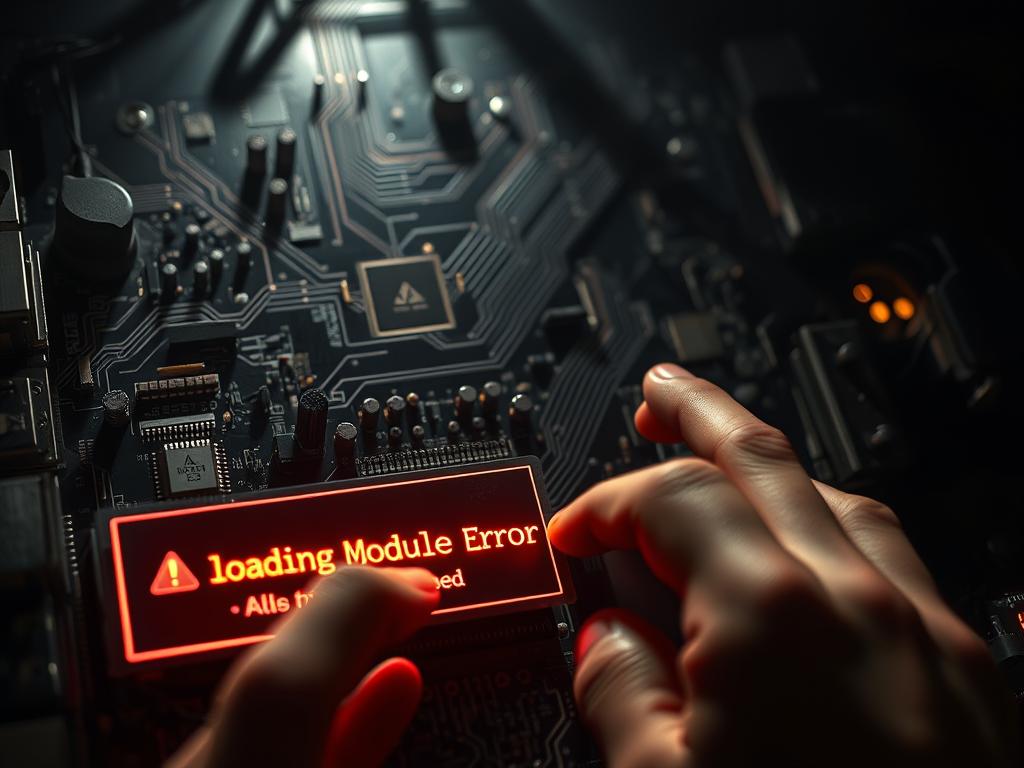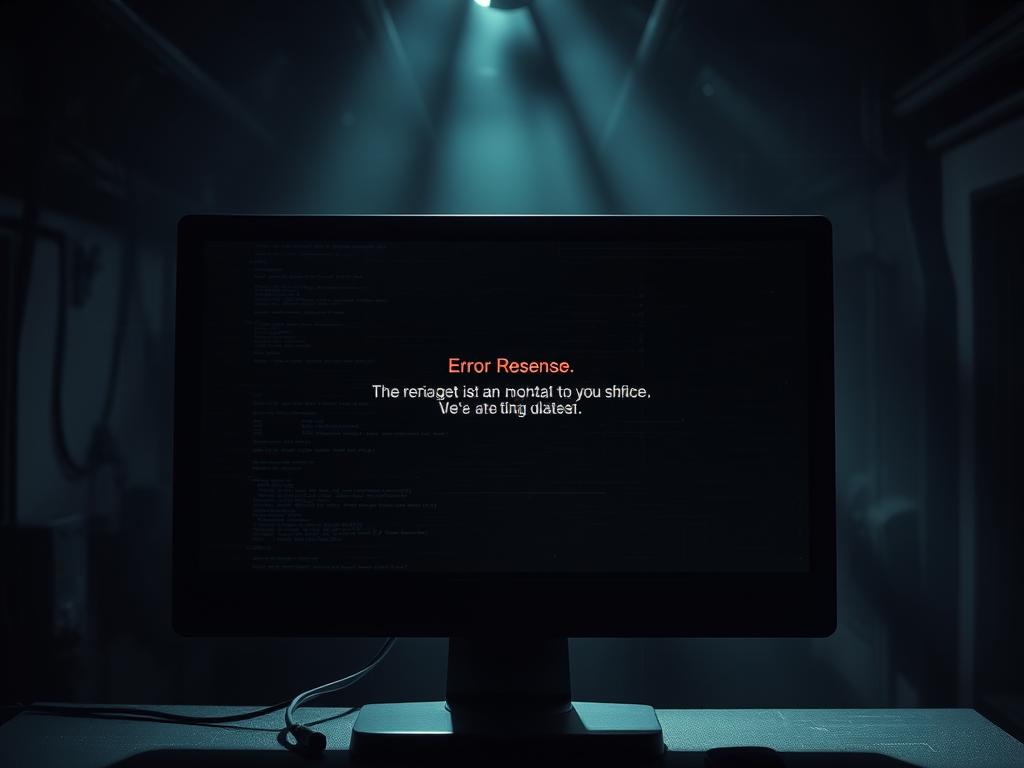When you see “Requested Module Experienced An Error While Loading,” it’s frustrating. This error stops your work and shows deeper problems. It’s important to know how to fix it to keep your system running smoothly.
We’ll look at why this error happens and how to solve it. This will help you avoid workflow problems and keep your system running well.
Key Takeaways
- Understanding the meaning of the error message is essential for quick resolution.
- Various scenarios may lead to the requested module experienced an error while loading.
- Identifying and troubleshooting module errors can prevent workflow disruptions.
- Regular maintenance of software can reduce occurrences of module loading issues.
- Each platform may require different approaches to fix the module loading error.
Understanding the Error Message
The error message “Requested Module Experienced An Error While Loading” is quite serious. It affects how modules work. It’s key to understand this message to fix problems quickly. This message usually points to a problem in the *ModuleScript*, not the script that asked for it.
What It Means When You See This Error
This error means there’s a snag in loading the module. It often pops up with modules like GameManager or DisplaysManager. To tackle this, you need to look into the module’s code. You might find errors or conflicts from updates. For more help, check out module loading error support.
Common Scenarios Leading to the Error
There are a few common reasons for this error. Failed updates can mess up module files. Conflicts with other scripts or modules can also block loading. And, sometimes, corrupted files in the module need fixing. Knowing these reasons helps users fix the problem faster.
Reasons Behind Module Loading Issues
Many things can cause module loading problems in software. Knowing why these issues happen is key to fixing them.
Corrupted Module Files
Corrupted module files are a big reason for loading issues. These problems can come from bad installations, interrupted updates, or system changes. When files get damaged, software can’t load modules right, showing error messages. Keeping software up to date and installing carefully can help avoid this.
Compatibility Problems with Software Updates
Software updates can also cause module loading errors. New updates might not work well with older software parts. For example, if a module needs a certain software version, updating without checking can fail. Always check if updates are compatible before installing.
Configuration Errors in Settings
Changing settings can sometimes cause problems. Users might accidentally mess with settings that affect module loading. These changes can clash with what’s already set up, leading to issues. It’s wise to keep original settings safe and be careful with changes.
| Issue Type | Possible Cause | Impact |
|---|---|---|
| Corrupted Module Files | Improper installation, Interrupted updates | Modules fail to load, Error messages |
| Compatibility Problems | Software component version mismatches | Increased errors, Functionality loss |
| Configuration Errors | Unintended changes in settings | Load failures, Disrupted user experience |
Troubleshoot Module Loading Error
Running into a module loading error can be really frustrating. To tackle this issue, it’s key to take systematic steps. Start by doing some basic checks that can give you important clues about the problem.
Initial Steps to Diagnose the Problem
First off, make sure your system meets all the requirements. This includes checking the software version and hardware specs. Then, double-check if the module is installed right by looking at installation folders and settings.
Also, consider these steps:
- Restart the application to refresh the state.
- Check for any pending updates that may need installation.
- Confirm user permissions to access the module files.
Using Logs to Identify Error Causes
Looking at system logs is vital to find out what’s causing the error. Logs often have detailed messages that help pinpoint the issue. Here’s how to use logs effectively:
- Find the right log files based on your operating system.
- Look for entries from the time the error happened.
- Search for keywords or phrases that hint at loading problems or dependency failures.
By following these steps and using logs, you can quickly narrow down the problem. This makes fixing the issue much faster.
Fix Loading Module Error
Fixing loading module errors needs a careful plan. You can try reinstalling the module or resetting software settings. These steps often solve the problem and get things working again.
Reinstalling the Affected Module
Corrupted files can stop a module from working. Reinstalling the module fixes this by replacing bad files with new ones. This is key if other fixes don’t work.
Resetting Software Configuration Settings
Too many changes in settings can cause errors. Resetting settings to default can fix this. It removes old problems and makes things run smoothly again.

| Method | Description | Benefits |
|---|---|---|
| Reinstalling the Affected Module | Replace corrupted files with new installations. | Ensures all module components are fully functional. |
| Resetting Software Configuration Settings | Restore original settings to eliminate conflicts. | Provides a clean slate for proper module function. |
Resolve Error Loading Module
When you face problems with loading modules, using advanced methods is key. Start by running hardware diagnostics. This step checks if all devices are working right, which is crucial for module loading. If devices are missing or not working, it can cause big problems.
Running Hardware Diagnostics
Starting hardware diagnostics helps find any issues that stop modules from loading. Most operating systems have tools to check if devices are working. For example, tests can check memory, hard drives, and other devices. These tests not only find problems but also show hardware conflicts that can slow things down.
Checking Dependencies and Libraries
It’s also important to check dependencies and libraries. If software is missing or outdated, it can cause module loading problems. Each module needs certain libraries to work right. Keeping these libraries up to date and installed can avoid many errors. Using resources like this guide can help manage libraries well.
| Step | Description |
|---|---|
| 1. Run Diagnostics | Utilize built-in tools to check for hardware issues. |
| 2. Identify Issues | Analyze results to find any discrepancies or failures. |
| 3. Update Libraries | Ensure all required libraries and dependencies are current. |
| 4. Test Module Loading | Retry loading the module post-diagnostics and updates. |
Module Loading Issue Fix for Different Platforms
Fixing module loading issues depends on the operating system. Each system has its own challenges and fixes. Here’s a guide for Windows, Mac, and Linux users.
Fixing on Windows Operating Systems
Windows users can fix module loading issues with a few steps. The System Restore feature can go back to a working state. Running utility programs can also fix corrupted files.
These steps help fix module loading issues on Windows.
Solutions for Mac Users
Mac users can solve module loading issues by resetting permissions and using Disk Utility. Disk Utility can fix disk permissions and solve conflicts. It’s also important to keep software up to date to avoid errors.
Troubleshooting on Linux Systems
Linux users can use command-line tools to find and fix module loading issues. Checking for missing dependencies or library conflicts is easy from the terminal. These tools help keep the system running smoothly.Knowing these tools is key for a reliable Linux system.

Best Practices to Avoid Module Loading Errors
To prevent module loading errors, we need to be proactive. We must follow effective strategies. Two key practices can greatly improve system stability and reduce problems.
Regular Software Updates
Keeping your software up to date is vital. Updates fix bugs, close security holes, and ensure everything works well together. Regularly checking for updates can help avoid module loading issues.
Backing Up Configuration Settings
Backing up your settings is also crucial. Regular backups let you quickly go back to previous settings if problems occur. This keeps your changes safe and protects against module failures.
| Best Practice | Description | Benefits |
|---|---|---|
| Regular Software Updates | Consistently applying updates to software components. | Prevents bugs and security issues, improves performance. |
| Backing Up Configuration Settings | Creating copies of current configurations for recovery. | Ease of restoration, minimizes downtime during errors. |
Requested Module Experienced An Error While Loading: Real-World Examples
Learning from module loading errors in real applications is key. Many industries struggle when their systems fail to load modules. This section looks at two examples that show why fixing these errors quickly is crucial.
Case Study 1: E-commerce Platform Failure
An e-commerce site went down because of a module loading error. Their inventory system couldn’t load needed modules, stopping customers from buying. This caused lost sales and hurt the site’s reputation.
The tech team looked into the problem and found outdated settings were the cause. They fixed it by testing and updating their systems to avoid future problems.
Case Study 2: Software Development Environment Issues
A software company faced constant issues in its coding environment. Developers couldn’t use their tools for coding and testing because of errors. This made their work much harder.
The team found the problem was in script settings, mainly with pet-related functions. They got advice from Stack Overflow to check module statements and event connections. This helped them work more smoothly and cut down on errors.
These examples show how important it is to fix loading errors. They not only highlight problems but also offer solutions to avoid similar issues in the future.
Conclusion
Fixing the problem when a module won’t load is key to staying productive. Knowing what causes this error helps you solve it. Look for issues like damaged files or compatibility problems to start fixing it.
Using detailed troubleshooting steps helps you find and fix the real problem. Regular updates and backups also protect your system from future issues. These steps improve your software’s performance and keep your computer stable.
In short, knowing how to handle module errors makes your work smoother. Being ready for these problems helps you stay productive and successful.












